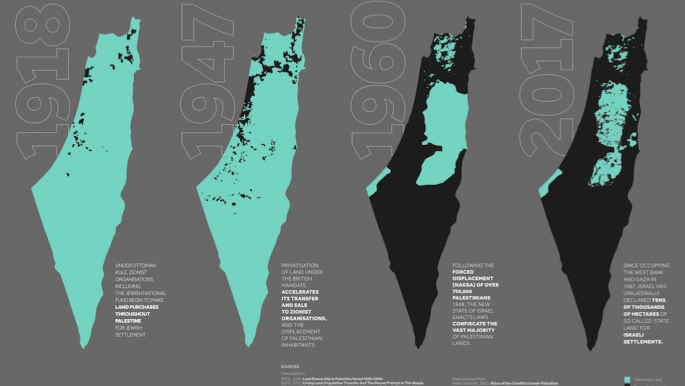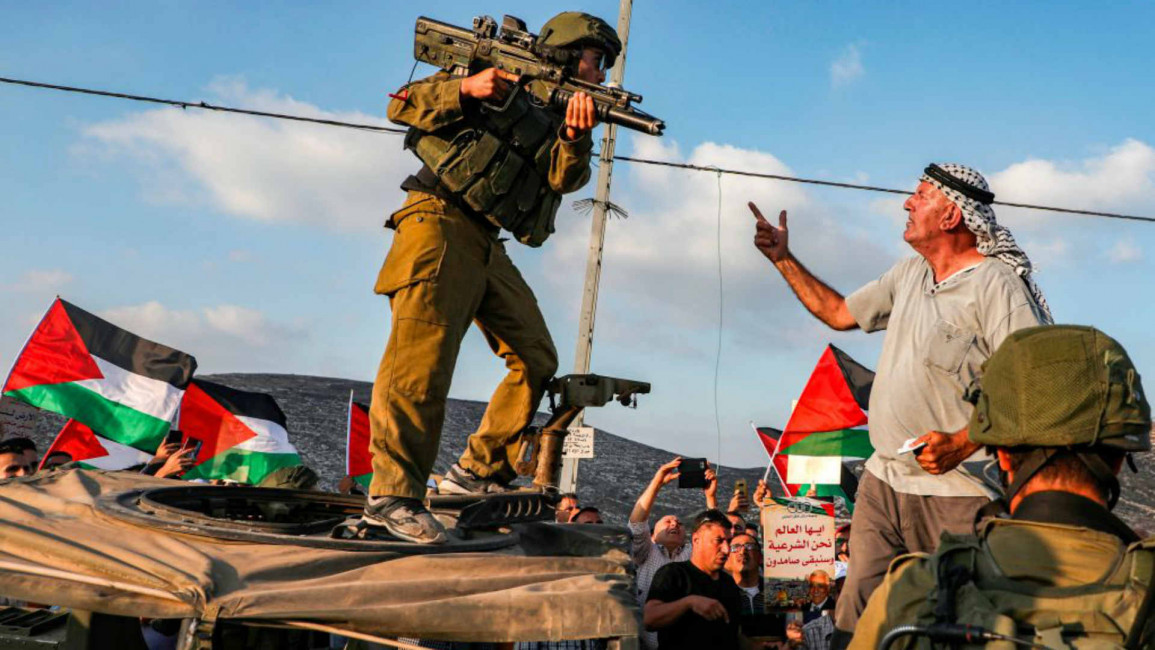
Israel's settler violence reeks of international impunity
Israel's settler-colonialism is an inherently violent endeavour. Routinely overlooked, and cultivating impunity, is the role of settler violence in supporting Israel's human rights violations.
Settling on stolen Palestinian land is one form of violence which has become normalised since 1948. Incursions into Palestinian territory by Israeli settlers intent on violence have become routine.
So much so, in fact, that the premeditated Duma arson attack in 2015 which resulted in the murder of three members of the Dawabsheh family, is now acquiring a new narrative.
In May this year, a Jewish settler earlier indicted for murder conspiracy in the Dawabsheh case settled for a plea bargain which was accepted by the Israeli courts.
In the agreement, the settler, whose name was withheld, was indicted, by his own admission for "conspiring to commit a crime motivated by racism." As a result, the earlier murder charges were dropped and the names of the Palestinian victims were no longer part of the settler's indictment.
Having avoided conviction for premeditated murder, the settler involved in the murder of the Palestinian family will now be enlisting with the Israeli army for one year of military training, allegedly to "adjust his behaviour".
In other words, the perpetrator is being rewarded with an opportunity to learn the state-sanctioned methods of oppressing Palestinians.
Israeli institutions' complicity in protecting perpetrators' impunity must be traced back to the colonial state itself.
Israel was founded upon the massacres committed by the predecessors of the Israeli army – Jewish paramilitaries which ethnically cleansed Palestinian cities, towns and villages. Decades later, the tactics have changed but the violence remains an integral component of Israel's state institutions.
 |
Yet Israel has not cultivated its impunity singlehandedly |  |
Which is why, in Israel, there is no outrage against the decision to enlist a murder accomplice within the ranks of military forces which routinely assassinate Palestinian civilians and protect settlers as they ravage Palestinian lives and lands.
The settler will now go from conspiring to murder Palestinians alongside other settlers, to having authorisation to kill Palestinians deliberately as part of the national army. His 'promotion' will, most likely, form part of Israel's culture of oblivion when it comes to crimes against Palestinians, which generates enough media attention to reach international scrutiny.
For its part, Israel sees nothing wrong with the development. The Israeli army, after all, is urged to kill Palestinians, notably when Israel embarks upon its intermittent phases of attacking Gaza.
Considerable electoral rhetoric this year centred on the level of aggression, which the contenders deemed would send out an appropriate message of elimination to Palestinians, particularly in Gaza.
 |
|
| [Click to enlarge] |
Since the Israeli non-profit organisation Breaking the Silence started bringing testimonies by former Israeli soldiers to public knowledge, ample information has materialised on how killing Palestinians is deemed a cause for celebration.
"You're not ranked by arrests - you're ranked by the number of people you kill," one testimony informs us. "The commanders said kill as many people as possible," the Guardian reported in 2005.
In 2015, testimonies from Operation Protective Edge reveal that there was no change in Israeli army engagement with Palestinians. "From the very start they told us, 'Shoot to kill'. As far as the army was concerned, there wasn't supposed to be any civilian population there," with reference to Gaza.
Elor Azaria, a soldier who killed 21-year-old Palestinian Abed al-Fattah Yusri al-Sharif in 2016, only served half his sentence and was consistently supported by Israeli ministers. His release was celebrated with a 'hero's welcome' by right-wing settlers in Hebron.
More recently, the UN Human Rights Council's commission of inquiry into the Israeli army's killing and injuring of Palestinian civilians during the Great Return March established that the deliberate targeting "many constitute war crimes or crimes against humanity".
 |
Incursions into Palestinian territory by Israeli settlers intent on violence have become routine |  |
However, it left the investigations up to Israel's discretion, despite the Israeli army placing over 100 snipers at the Gaza border, "with permission to fire" upon the demonstrators.
Like anything else left up to Israel to investigate, the perpetrators will primarily be shrouded in impunity to deflect even a minimal admission of wrongdoing. After all, in Israeli discourse, human rights violations are persistently justified due to Israel maintaining its state of exception.
Yet Israel has not cultivated its impunity singlehandedly. The international community's approval of Israel's purported right to defend itself is woven into the settler-colonial agenda and actions.
Israel's presence in Palestine is a human rights violation.
Read more: The camera: A Palestinian weapon of choice
Likewise the action of its settlers and soldiers mirror that of the colonial state. In terms of alleged defence, both settlers and soldiers have constructed the Palestinian people as enemies and, in colonial terms, legitimate targets.
The UN's reception of Israel within its ranks is automatically an endorsement of colonialism and its ramifications. Every time the UN upholds Israel's security narrative, it is also approving the killings of Palestinian civilians while generating impunity for Israel's actions.
As Israel's security narrative is absorbed at an international level, the UN metes out endorsements for the Israeli army. Earlier this month, the UN Under-Secretary-General for Political and Peacebuilding affairs, Rosemary DiCarlo tweeted about productive meetings with Israeli interlocutors, among them the Israeli army. "Resuming the peace process is critical for resolving the Israeli-Palestinian conflict," she stated.
The UN's duplicity is evident. It calls out Israel's army for possible war crimes - always inserting an element of doubt despite evidence. At the same time, it speaks about the army in terms of peacebuilding and security, even though Israel's state institutions are part of the colonial violence unleashed upon Palestinians.
 |
Like anything else left up to Israel to investigate, the perpetrators will primarily be shrouded in impunity |  |
How does the UN differ from Israel and its institutions when it condones, through supporting colonialism, the human rights violations against Palestinian civilians?
Furthermore, why does it, as a result of upholding Israel's purported right to defence, sanction settler terror and its outcomes, including normalisation by the Israeli state, to the point of opening a pathway for criminals into the Israeli army?
The UN's perpetual support for Israel reeks of permanent injustice to Palestinians. If it continues to excuse Israel and its military by adopting its security narrative, Palestinians can only face additional violence by settlers, while Israel makes a spectacle of their suffering by protecting the settler-colonial perpetrators.
Ramona Wadi is an independent researcher, freelance journalist, book reviewer and blogger specialising in the struggle for memory in Chile and Palestine, colonial violence and the manipulation of international law.
Follow her on Twitter: @walzerscent
Opinions expressed in this article remain those of the author and do not necessarily represent those of The New Arab, its editorial board or staff.


![Minnesota Tim Walz is working to court Muslim voters. [Getty]](/sites/default/files/styles/image_684x385/public/2169747529.jpeg?h=a5f2f23a&itok=b63Wif2V)




